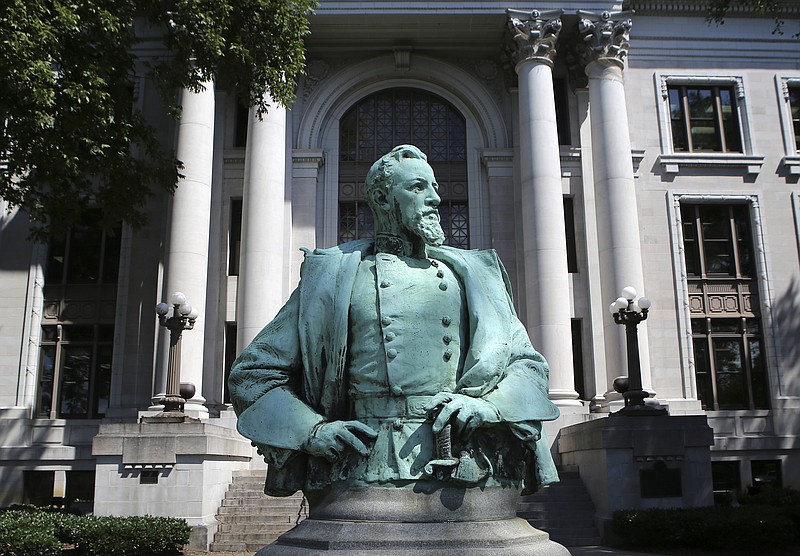The 98-year-old statue of Confederate Gen. Alexander P. Stewart should come down.
It does not belong outside the Hamilton County Courthouse.
It should have never been erected to begin with.
I don't care whether Stewart was a so-called good man, as some historians and sympathizers say. Or that he was a law-abiding church elder. Or helped create the Chickamauga and Chattanooga National Military Park.
All that is irrelevant. Want to judge Stewart?
Judge him on this: his stance on slavery.
And Stewart didn't fight against slavery.
He fought for it.
The general whose statue is outside our own courthouse took up arms on behalf of a land that legalized and celebrated human bondage.
His goodness was not good enough.
Making the Good Man argument on Stewart's behalf waters down morality, courage and true goodness. If Stewart had been so good and moral, he would have never fought as a Confederate general, but instead risked his life to set free those in chains all around him.
Because other Southerners did.
They were abolitionists.
They were the real Southern heroes, theirs the truest love of the South: to liberate it from the hell of legal slavery.
The Good Man argument insults the massive courage those abolitionists summoned forth, mystifying their inner compass, as if only a certain few Southerners were able to recognize the blatant evil of slavery before them. It excuses Stewart – and by extension, us – from having the vision to see and distinguish good from rampant evil.
Stewart's statue sends the message that it's morally acceptable – not just acceptable, but praised – to skim past egregious wrongs. Yet in the hierarchy of values, recognizing the sin of slavery comes before all else.
Not states' rights.
Not the Constitution.
We must have eyes to see that. Then. And now.
The theologian C.S. Lewis wrote of cheap grace; this is cheap heroism.
Would we erect a statue today of a man who fought to defend human trafficking? (But he was a church elder! And patriotic! Coached Little League!) Do you not see how overlooking the thing that should never be overlooked makes a mockery of values? How such compromised morality could be viewed by area blacks, often the very descendents of those held in bondage that Stewart somehow excused?
No, he didn't own slaves.
So what?
Stewart maintained a "visceral belief in the inferiority of people of African descent," writes biographer and local attorney Sam Davis Elliott in "Soldier of Tennessee."
Stewart held a "distaste for blacks being on an equal social footing with whites."
He believed in slaves as property, arguing the North was wrong for opposing fugitive slave laws.
After the war, he privately questioned Reconstruction, asking in a letter if the coming future – suffrage, political and social equality of freed slaves – could be "averted."
"Stewart always spoke of the slavery issue in terms of the recognition of constitutional property rights rather than the moral aspect of involuntary servitude," Elliott writes. "It is certainly reasonable to conclude that Stewart's views of blacks largely comported with the beliefs of his southern contemporaries."
And this is the man we idolize outside our courthouse?
This Saturday at 7 p.m., the Chattanooga chapter of the NAACP is hosting a vigil outside the Hamilton County Courthouse. There's a petition - sign it at naacpchattanooga.org - asking for the statue's removal.
I write none of this lightly. Staring in the mirror, I am terrified to wonder at my own moral courage had I lived in the antebellum South.
That's why we need models of the highest morality and courage before us.
Not the statue of a good man who wasn't good enough.
David Cook writes a Sunday column and can be reached at dcook@timesfreepress.com or 423-757-6329. Follow him on Facebook at DavidCookTFP.

